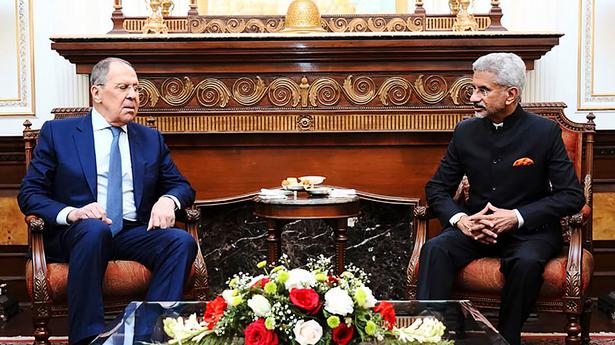
Is India’s position on Russia affecting its relationship with the U.S.?
The Hindu
While India has explained its stand on the war and its ties with Russia, the U.S. remains ‘disappointed’
Last week, India’s strategic partner, the U.S., warned of consequences for any country, including India, which conducts local currency transactions through Russia’s central bank or constructs a payment mechanism that subverts or circumvents the U.S.’s sanctions against Russia. India’s consistent neutral position on Russia’s invasion of Ukraine, informed by its choices, has antagonised many countries, including the U.S. Will the relationship between the U.S. and India come under strain? In a conversation moderated by Suhasini Haidar, Lisa Curtis and Syed Akbaruddin weigh in on India’s non-aligned position on the war. Edited excerpts:
Lisa Curtis: There is a slight difference between the view of the American public, which is one of frustration, confusion and lack of appreciation for India’s position, and the view of the Joe Biden administration. As somebody who has followed the U.S.-India relationship for 25 years, I’ve been disappointed by India’s lack of condemnation of Russia, and its seeming lack of appreciation for the U.S.’s deep security interests in Europe and the horrific war that Russia has waged on Ukraine. That said, the Biden administration has taken the long view of India and places high value on the strategic partnership with India. New Delhi is playing a central role in the U.S.’s Indo-Pacific strategy and its approach to China. Where you see a lot of frustration coming from U.S. Congressional members, you see a much more patient approach from the Biden administration. But I wonder how long the administration’s forbearance can last, unless we see some kind of shift in India’s position, which perhaps we’re starting to see, with the recent reports of civilian casualties. This is a welcome change. But how far India will adjust its position, we don’t know.
Syed Akbaruddin: I would term India’s position as evolving. If you look at where we began and where we are today, we’ve traversed a fairly long path. If you look at the first couple of statements that India made, there was not even a reference to international law, or to violation of territorial integrity and sovereignty. For any observer of Indian foreign policy, it is clear that India’s position is evolving: it is now repeatedly criticising the transgression of international law and violation of territorial integrity and sovereignty. There is regret for the outbreak of hostilities. All these statements, without naming [Russia], are clearly aimed at indicating unhappiness towards what Russia has done. Not only does the latest statement [on Bucha] condemn civilian killings, but for the first time in recent memory, India has supported an independent inquiry.
When it comes to conflict, there are many instances where India remained quiet and stayed neutral, including the one in Hungary in 1956, or in the Czech Republic (which was then Czechoslovakia) and in Afghanistan in 1979. Perhaps you can call it hedging. Perhaps you can call it playing safe. But there is a trajectory and history to this approach.
LC: It is not just Western countries that have condemned Russia’s actions; over 140 nations voted to condemn Russia’s actions in the United Nations General Assembly. India is isolated in its position of abstaining from condemning Russia’s actions in any way. While India may consider its position to be neutral, I think the rest of the world, or at least most of the rest of the world, sees India as being supportive of Russia.
LC: The U.S. understands that India still relies on Russian military equipment for 60-70% of its military needs. The U.S. also understands that India is under threat from China. Only two years ago, India faced a major crisis with 20 Indian soldiers being killed on the border, the first time it faced a loss of lives on the India-China border in many decades. If the India-China border issue heats up again, obviously India is going to rely on its military supplies from Russia. The U.S. understands that.
If India were to take advantage of discounted Russian oil, if it were to substantially increase its oil imports from Russia, I think that would be difficult for U.S. officials to understand. What would not be understood is if India takes advantage of the situation and props up the Russian economy at a time when the rest of the world is trying to isolate Russia. If India is seen as trying to skirt those sanctions, there would be a lot of frustration with India.





















 Run 3 Space | Play Space Running Game
Run 3 Space | Play Space Running Game Traffic Jam 3D | Online Racing Game
Traffic Jam 3D | Online Racing Game Duck Hunt | Play Old Classic Game
Duck Hunt | Play Old Classic Game











